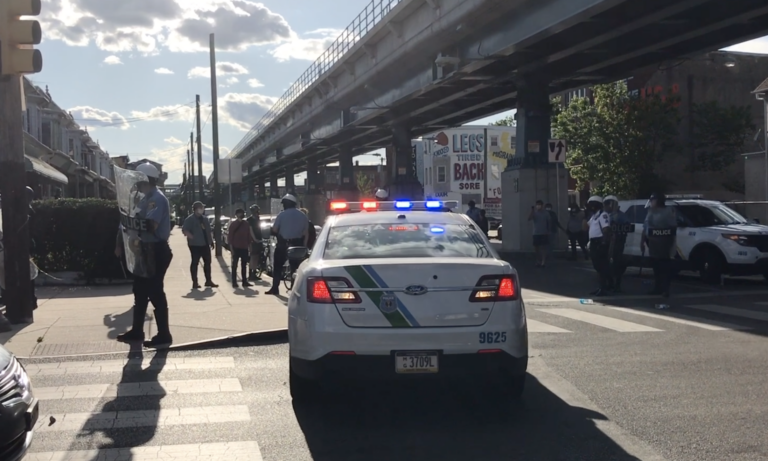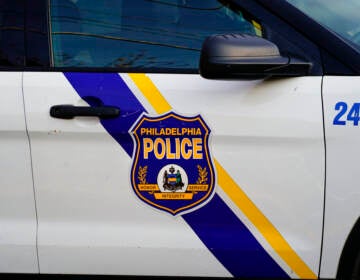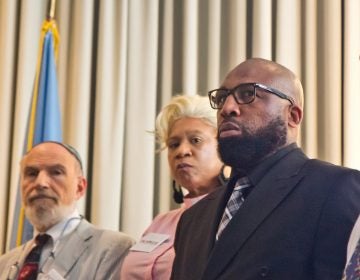Philly police to start flagging 911 calls that involve a behavioral health crisis
The city of Philadelphia announced Friday a new initiative to improve police response to 911 calls coming from people having a behavioral health crisis.

Police officers congregating in West Philadelphia at 6:10 p.m. on May 31, 2020. (Photo anonymously provided)
The city of Philadelphia announced Friday a new initiative to improve police response to 911 calls coming from people having a behavioral health crisis. The program is an effort to steer residents in need of mental health or substance abuse care toward support instead of an encounter with law enforcement.
The first stage of the program, a partnership between the Philadelphia Police Department and the Department of Behavioral Health and Intellectual disAbility Services, is already underway. For two weeks, a clinically trained behavioral health provider has been embedded in the 911 radio room, listening in with call-takers and dispatchers to recognize and accurately label the calls that involve someone in mental or emotional distress.
The Philadelphia Police Department already has a protocol for handling behavioral health crises: the department began training Crisis Intervention Teams in 2007 and nearly half of its 6,400 officers have been trained in crisis response.
Francis Healy, Special Advisor to Commissioner Danielle Outlaw, said the problem is that officers don’t usually identify a situation as requiring an officer trained in crisis intervention until they are already on the scene, at which point it may be too late. By flagging the issue further “upstream,” Healy envisions being able to dispatch a more appropriately trained team from the get-go. They might end up deploying both a behavioral health specialist and officer.
“We have, over years, been tasked with assuming more and more responsibility because we are the only people available 24/7,” said Healy of the police department. “But oftentimes, we may not be the best response, so the ability to have alternates and be able to be the second chair when responding to these incidents, I think, would have a great deal of impact in de-escalating them.”
Healy said he hopes to begin sending behavioral health specialists with officers by the end of the year.
The PPD doesn’t have a current code for behavioral health calls — that’s part of what this program will develop — so there isn’t good data on the proportion of 911 calls coming in that involve someone experiencing a behavioral health issue. Nationally, it’s estimated roughly one in ten police calls is in response to someone with severe mental illness.
Research supports training police in identifying mental health crises and integrating behavioral health specialists into police departments. Philadelphia is looking to a similar program in Los Angeles as a model.
Integrating more clinical perspectives into police work is long overdue, said Evan Anderson, a researcher at the University of Pennsylvania who focuses on the intersection of law enforcement and public health.
“Police might have crisis-intervention training which is great, but the broader training that clinicians have is often indispensable to helping people in those moments,” said Anderson, who is in the process of evaluating Philly’s Police Assisted Diversion program. “We always should have been doing this.”
Several times over the last year, Philadelphia police have escalated crisis situations involving people with behavioral health issues. In May of 2019, a police detective shot an unarmed, intellectually disabled man who approached his car asking for change. Later that year, police shot Darrin Lee in Kensington, who was suffering from mental health issues.
Since the killing of George Floyd, calls to defund the police and shift funding from policing to mental health and other social services have become mainstream both nationwide and in Philadelphia. Healy said he hopes an initiative like this one can restore some trust with the community, so that they can think of the police more as dispatchers, deploying the best resource for whatever a caller needs.
“They want help when they call 911 and, regrettably, we may not be the best help sometimes,” he said. “But we can help facilitate and make sure that gets to the right people.”
This initiative involves a reallocation of resources for PPD and DBHIdS and comes at no cost to either department.
Integrating a behavioral health specialist into the radio call center is the latest in a patchwork of partnerships between police and public health that the city has adopted in recent years.
In its Eastern District, police and behavioral health specialists work together to patrol the streets and assist those who may be dealing with substance use disorders or mental health issues, but not in response to a 911 call. The Police Assisted Diversion program allows officers to use their discretion to avoid arresting low-level offenders and steer them toward treatment or community service. The AR-2 unit in Kensington deploys a social worker with a paramedic when called to the scene of an overdose.
Some critics worry if mental health and substance use is addressed primarily through law enforcement, some coercive models employed by police might seep into the public health response, leading to more avenues for behavior to become criminalized.
Penn’s Anderson said that, of course, that care should happen earlier, too, but leveraging the police as the one entity capable of rapid intervention makes sense.
“Maybe we can imagine a world where there is less responsive police, but I think for now it’s a really worthwhile, incremental step to proceed with co-deploying,” he said.

Get daily updates from WHYY News!
WHYY is your source for fact-based, in-depth journalism and information. As a nonprofit organization, we rely on financial support from readers like you. Please give today.





